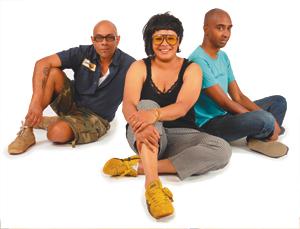In Bengali, it means red. But for lovers of high-energy music with a conscience, LAL means a red-hot band of troubadours made up of Nicholas Murr, Ian de Sousa and Rosina Kazi.
LAL puts on a captivating live show and leaves a memorable impression with a blend of hip hop, electronic beats and world music. Lead singer Kazi possesses a rich, husky voice that weaves its way between the band’s mix of programming and live instruments.
“We actually started off with laptop and voice electronica,” says Kazi, known better to her fans as Rose. “We belonged to the club culture, and it was a natural environment for us.”
As the band moved from hip hop to dance music, they began to experiment with world sounds and rhythms drawn from various cultures.
“Nick is from the West Indies, I’m from Bangladesh, and Ian is from Goa, so we’ve brought more of that in. Over the years we have morphed into this band that has a real push and pull between live and dance music with all different influences.”
The trio’s hip-hop roots are clearly apparent in their first album, Corners, which was released in 2002. They followed it up with 2004’s Warm Belly, High Power, which drew raves for its soulful vibe and activist lyrics. By the time Deportation came out in 2008, LAL had solidified its reputation as a powerhouse band with a meaningful message.
“We’ve always had a focus on social justice,” Kazi says. “A lot of our songs are about being okay with who we are and being open to other things and other people.”
Some songs, like “Self Defence,” are inspired by specific situations, like the rights of indigenous people, while others come from a more personal place.
“We just shot a video for our song ‘Steady,’” says Kazi. “It’s about depression and mental illness… something we don’t talk about nearly enough.” Kazi talks about it, though, in song as well as in person. As someone who has lived with depression at different points in her life, she feels it’s important to share those experiences and let others know they’re not alone. “I don’t try to speak on people’s behalf, but this is a bigger problem than people think. I’ve had audience members come up to me onstage and start talking about their own depression. It can be very stigmatizing out there.”
Nicholas Murr was heavily into rap music before joining forces with Kazi back in 1998 (de Sousa came on board for the band’s third disc). They met in Toronto’s club scene and were drawn together by their love of electronic music and activism. With Murr writing most of the music and Kazi taking charge of the lyrics, they began to create LAL’s ethos of fun mixed with social responsibility.
“It’s a really free, no-bad-vibe environment that we try to create,” says Murr. “All are welcome.” Touring and recording without benefit of major-label support can be taxing for any young band; it’s a real testament to the members’ determination that LAL continues its journey more than a decade after its inception.
“There is this idea of not really seeing the destination but knowing we’re headed somewhere,” Murr says. “It’s never been about anything else, really, but the music. Sure, we’ve had some rough spots, but the vision of the band is to allow people the space to disagree sometimes. Then you can move on from that. You can reinvent yourself.”

 Why you can trust Xtra
Why you can trust Xtra


